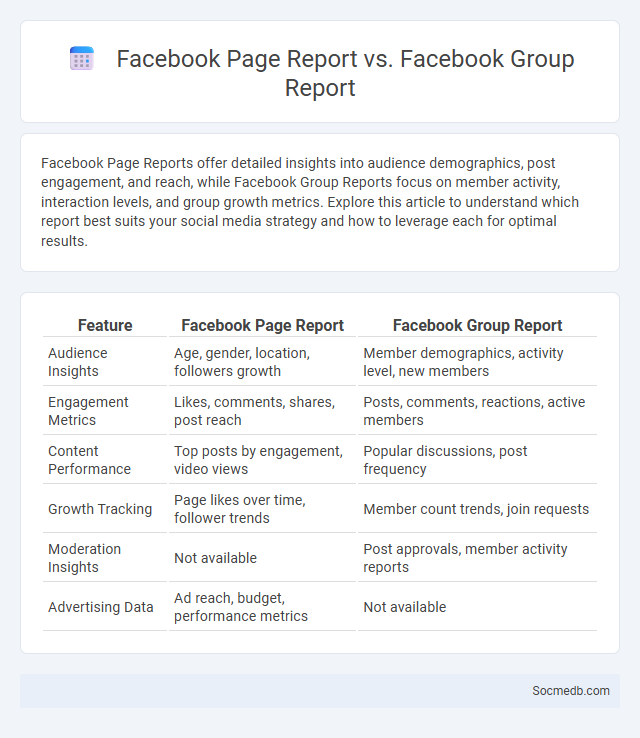
Photo illustration: Facebook Page Report vs Facebook Group Report
Facebook Page Reports offer detailed insights into audience demographics, post engagement, and reach, while Facebook Group Reports focus on member activity, interaction levels, and group growth metrics. Explore this article to understand which report best suits your social media strategy and how to leverage each for optimal results.
Table of Comparison
| Feature | Facebook Page Report | Facebook Group Report |
|---|---|---|
| Audience Insights | Age, gender, location, followers growth | Member demographics, activity level, new members |
| Engagement Metrics | Likes, comments, shares, post reach | Posts, comments, reactions, active members |
| Content Performance | Top posts by engagement, video views | Popular discussions, post frequency |
| Growth Tracking | Page likes over time, follower trends | Member count trends, join requests |
| Moderation Insights | Not available | Post approvals, member activity reports |
| Advertising Data | Ad reach, budget, performance metrics | Not available |
Overview: Facebook Page Reports vs Group Reports
Facebook Page Reports provide detailed analytics on follower demographics, post engagement, and reach, helping you understand how your audience interacts with your branded content. Group Reports focus on member activity, including participation levels, growth trends, and popular discussion topics, enabling deeper insight into community dynamics. Your choice between these reports depends on whether you want to optimize public brand visibility or foster active group engagement.
Key Differences Between Page and Group Reporting
Page reporting on social media provides detailed insights into audience demographics, post engagement, and reach metrics, enabling businesses to track brand awareness and content performance effectively. Group reporting emphasizes member activity, including participation rates, post frequency, and interaction levels, which helps admins monitor community health and engagement quality. Understanding these key differences allows marketers to select the appropriate tool for measuring outcomes aligned with their social media strategy.
Metrics Available in Facebook Page Reports
Facebook Page Reports offer key metrics such as reach, engagement, and follower demographics to help you understand your audience's behavior. Insights include page views, post clicks, and video retention rates, allowing you to optimize content for better performance. Tracking these metrics ensures your social media strategy aligns with user preferences and drives meaningful interactions.
Insights Offered by Facebook Group Reports
Facebook Group Reports provide detailed insights into member engagement, including activity trends, post reach, and interaction metrics. These analytics help group admins identify popular content types and peak activity times to enhance community management. By tracking growth patterns and member demographics, admins can tailor strategies for targeted group development and increased user retention.
Accessibility: Who Can View Each Report Type?
Social media platforms offer varied accessibility settings for reports, allowing you to control who can view each report type based on privacy preferences and user roles. Public reports on social media analytics are typically accessible to everyone, while private or team-specific reports restrict visibility to designated individuals within an organization. Understanding and managing these accessibility options ensures that your sensitive data and insights remain secure and are shared only with the appropriate audience.
Data Visualization in Page vs Group Reports
Analyzing Data Visualization in Page vs Group Reports reveals distinct metrics tailored to each platform's interaction style. Page reports focus on audience reach, post engagement, and demographic trends, providing insights into how users interact with your branded content. Your ability to interpret group reports emphasizes member activity, discussion dynamics, and content relevance, enabling deeper community engagement analysis.
User Engagement Analysis: Pages vs Groups
User engagement on social media differs significantly between pages and groups, with groups typically fostering more interactive and meaningful conversations due to their community-oriented nature. Pages often serve as broadcast platforms, generating higher content reach but lower engagement rates per post compared to highly active groups where members feel a stronger sense of belonging. Analyzing metrics such as comment frequency, post sharing, and reaction rates reveals that groups outperform pages in creating sustained user interactions and loyalty.
Best Use Cases for Page and Group Reports
Page and Group Reports on social media platforms provide vital insights into user engagement, content performance, and audience demographics. Analyzing these reports helps businesses optimize posting strategies, tailor content to target audiences, and increase overall reach and interaction. Leveraging data from these reports enhances community management, identifies trending topics, and supports effective campaign adjustments.
Limitations of Facebook Reporting Tools
Facebook reporting tools often struggle with delayed data updates, which can hinder real-time decision-making for marketers and advertisers. These tools provide limited customization options for in-depth analytics, restricting users from gaining comprehensive insights into campaign performance. Furthermore, data accuracy issues and discrepancies between Facebook's metrics and third-party analytics platforms reduce the reliability of Facebook's reporting suite.
Choosing the Right Report for Your Social Strategy
Selecting the appropriate social media report aligns data analysis with your strategic goals, ensuring targeted insights on metrics like engagement rate, reach, and conversion tracking. Custom reports tailored to platforms such as Facebook Insights or Twitter Analytics enable marketers to evaluate content performance and audience behavior effectively. Leveraging these detailed analytics drives informed decision-making and optimizes campaign effectiveness within your social strategy.
 socmedb.com
socmedb.com